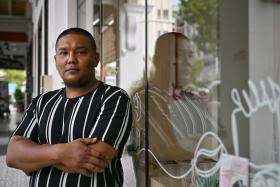Institution S2 to house offenders on upcoming work, education, training scheme
Institution S2, the work release centre that is part of the Selarang Park Complex (SPC), will be set aside for offenders who are working, schooling and attending courses towards the tail end of their sentences.
These inmates will fall under the Employment Preparation Scheme (EmPS), which was one of the key amendments in the Prisons (Amendment) Bill 2021 introduced in Parliament on Nov 1 and seeks to improve inmates’ rehabilitation and reintegration upon their release.
EmPs will replace the current Work Release Scheme.
SPC, an integrated hub for rehabilitation of inmates, comprises a drug rehab centre, halfway house, S2, and other facilities.
Launched in April, Institution S2 in Upper Changi North will house up to 1,200 offenders who will stay in dormitories and share a community space to help them in their reintegration.
Minister of State for Home Affairs and National Development Muhammad Faishal Ibrahim described the facility as a hybridisation of a “correction and community setting” that prepares inmates for life after their release.
He said during a media tour of Institution S2 on Tuesday (Dec 21): “We hope this can enhance the employability of ex-offenders and give assurance to employers that the people they are employing have the skills and values needed.”
At S2, a low-to-medium security facility, inmates will be subject to electronic monitoring, curfew hours and regular reporting to prison authorities, but they will mostly manage their own time in the premises.
They can receive newspapers and watch TV in their rooms and can leave for work or studies when they need to, play sports in the yard and buy drinks from vending machines with a CashCard.
Eligible inmates will be assessed by the Singapore Prison Service to see if they are suitable for the EmPS.
They will go through an in-camp phase, where they can attend classes and skills training work and outside prison during the day and return to the centre in the evening.
With good progress, they can move on to the weekend home leave phase and finally the long home leave phase, where they can remain at their own home daily after work and training.
Under the EmPS, each offender will be assigned to several professionals who assist with their rehabilitation and reintegration, including a case manager to link offenders up with social services and support when needed.
A career coach from the Yellow Ribbon Singapore will also mentor inmates to better adapt to job demands, build bonds with employers and manage their work performances.
The programme works in line with the SkillsFuture scheme, which aims to give Singaporeans opportunities to work at different stages in life, said Dr Faishal.
“As a society, we want to give them a second chance and these efforts can help them go into a job with skills. It may take some time, but we have provided a framework here.”
Many inmates find jobs in the environmental services, food and beverage and logistics sectors, said Superintendent of Prisons Ho Kim Teck, 41, who is also the senior assistant director of the prison’s Community Reintegration Branch.
“The comprehensive support and case management will go a long way to reintegrate them,” he said.
“The option to attend classes can help them to secure jobs, and better paying jobs, to help them stay away from crime.”

Under the EmPS, each offender will be assigned to several professionals who assist with their rehabilitation and reintegration, including a case manager to link offenders up with social services and support when needed.
A career coach from the Yellow Ribbon Singapore will also mentor inmates to better adapt to job demands, build bonds with employers and manage their work performance.
The programme works in line with the SkillsFuture scheme, which aims to give Singaporeans opportunities to work at different stages in life, said Dr Faishal.
"As a society, we want to give them a second chance and these efforts can help them go into a job with skills. It may take some time, but we have provided a framework here."

Many inmates find jobs in the environmental services, food and beverage and logistics sectors, said Superintendent of Prisons Ho Kim Teck, 41, who is also the Senior Assistant Director of the prison's Community Reintegration Branch.
"The comprehensive support and case management will go a long way to reintegrate them," he said.
"The option to attend classes can help them to secure jobs, and better paying jobs, to help them stay away from crime."
Get The New Paper on your phone with the free TNP app. Download from the Apple App Store or Google Play Store now


